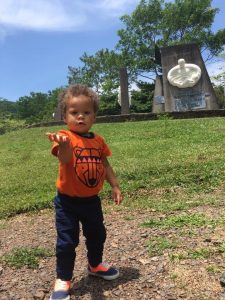Global Citizenship: it’s the little things
Global Citizenship: it’s the little thing
Guest Blog by Kelley Haynes-Mendez, Licensed Psychologist & Associate Professor at the Chicago School of Professional Psychology
It’s the little things citizens do. That’s what will make the difference. –Wangari Maathai
For me, the summer months are a time to slow down and spend more time with my family. We are also very fortunate to have opportunities to travel and visit other places – and seem to take advantage of this opportunity during the summer. Two summers ago, we took my son’s first international trip to Costa Rica where my husband (his father) was born and raised. I was traveling there for work – at the University for Peace (UPEACE), established by the General Assembly of the United Nation – and my son and mother came along with me.
A few days prior to the workshop I was attending, we made a visit to the UPEACE campus so that my family could see where I would be spending my days during the following week. In what is one of my favorite photographs of my son, he is standing atop the monument at the UPEACE Park, arm outstretched and open-handed as if offering a little handful of peace. I, like many other parents, would like for my son to grow up empathic and kind. I want him to be conscientious about the world and aware of how his behavior impacts the experiences of others; both locally and globally. In short, one of my goals as a parent is to raise a global citizen.
Global citizenship is defined in many ways, but all incorporate a way of being in the world that goes beyond ideology. According to UNESCO, being a global citizen involves assuming an active role to face and resolve global challenges in addition to being a proactive contributor to a more peaceful, tolerant, inclusive and secure world. Overall, the notion is that we do not live isolated lives. We are intertwined with others across the globe in both tangible and intangible ways. Ultimately, we must be willing to both appreciate and embrace other cultures, as well as to take stock of how our actions (and the actions of our governments) influence the lives of others.
In 2004, Dr. Wangari Maathai was awarded the Nobel Peace Prize for her contributions to sustainable development, democracy and peace. Through her organization, The Green Belt Movement, Dr. Maathai led an environmental movement in Kenya that included tree planting, water harvesting and women’s empowerment. Dr. Maathai believed that our small, everyday actions can make a significant and positive impact in the world. She is quoted as saying “It’s the little things citizens do. That’s what will make the difference. My little thing is planting trees.”
We do not have to create large social movements in order to make a positive impact on the world (but if you are, that’s great — keep going!). There are also small and meaningful everyday actions that make a big difference. Whether organizing a neighborhood clean-up, volunteering at a cultural center, or just helping out a neighbor, there are many small but significant actions to take each day in order to engage the world around us.
For those of us working in education, we will soon begin a new school year. Or, maybe you are a parent living with students. If not, we are halfway through the year and perhaps you are willing to consider how to finish out the rest of the year in a more meaningful way. Whatever the case, now is a good time to think about the efforts within your own family, neighborhood or community that could promote a world that is more peaceful, tolerant, inclusive and secure for all members of society. As Dr. Maathai states, it will be these little things that make a difference. Be a global citizen. The world is waiting for your ‘little thing’ that will contribute to making the world a better place for us all.
Kelley Haynes-Mendez is a contributor to the UPEACE Centre for Executive Education blog. She is a licensed psychologist and Associate Professor at the Chicago School of Professional Psychology, teaching primarily in the area multicultural psychology with professional interests in global citizenship education. Ms. Haynes-Mendez organizes professional development seminars for educations leaders in conjunction with the UPEACE Centre for Executive Education.






